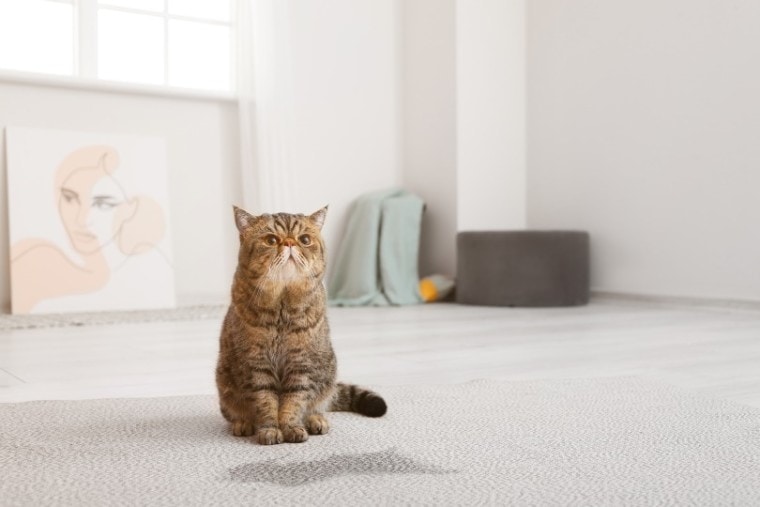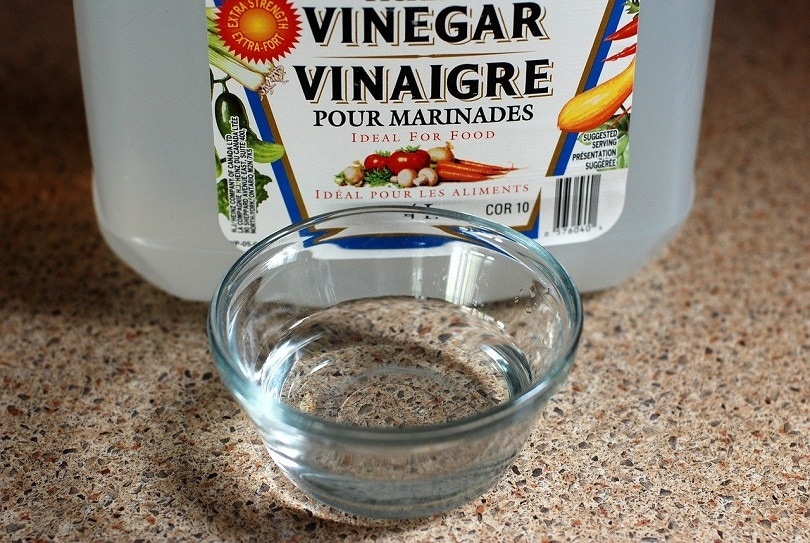
Although you provide your cat with a self-contained bathroom, sometimes they still make a mess outside of the litter box. Cleaning up urine from any pet is unpleasant, but feline urine is especially potent due to its high ammonia content. Since cats recognize the scent of their urine, they tend to use the same spot to relieve themselves.
Unfortunately, this can be an area on your carpet or your clothes that still contains a faint odor from a previous accident. Keeping your pet focused on using the litter box may seem complicated, but you can use natural fragrances to keep them away from trouble areas.
Before You Begin
Several DIY methods for deterring cats include essential oils, but we prefer fresh herbs or plants to keep cats away. Although you can dilute oils to make them less potent, most veterinarians caution against using them in your home when you have cats or dogs.
Many essential oils are toxic to cats. Cats lack the necessary enzymes to metabolize them, so our recommendation is to err on the side of caution and avoid using essential oils in your home if you have a cat or a dog.
We included commercial scents in this list, but we recommend only using them as a last resort. Most deterrent sprays contain some form of essential oil.
The 8 Smells That Deter Cats From Peeing
1. Citrus

| Cost: | Low |
| Materials: | Citrus peels, coffee filter or sock |
Too much citrus can be toxic to cats, but you’re unlikely ever to see your pet bite into a lemon or orange. Cats dislike the scent of citrus, and they will not feel comfortable urinating in an area with citrus peels nearby. You can mix orange or lemon juice with an equal amount of water to create a citrus spray, but you have to be careful which fabric you use it on.
Acidic juice will discolor some fibers, and the spray may be better to use on a solid surface like concrete. For carpeted areas and fabrics, you can place a sachet of citrus peels near a spot you want your pet to avoid. Coffee filters and old socks make excellent peel containers because they allow for airflow. You should avoid using airtight bags or containers.
2. Vinegar

| Cost: | Low |
| Materials: | Vinegar, water, spray bottle |
Vinegar solutions effectively remove cat urine odors, and they can also prevent your furball from urinating away from the litter box. Mix ½ cup of vinegar with 1 cup of water, and pour it into a spray bottle. Lightly spray the spot that you want your pet to avoid, and re-apply each day to keep the odor strong. Vinegar works as a cat deterrent, but its strong scent may bother the others in your home. If you do not dilute vinegar before spraying, it can lighten some fabrics.
We suggest using distilled white vinegar rather than other varieties. Red wine, apple cider, and rice vinegar can stain fabrics and require an additional cleaner to remove the stain.
3. Rosemary

| Cost: | Low |
| Materials: | Fresh rosemary, coffee filter, or sachet |
Rosemary is a perennial herb that grows vigorously in the warm months. Fresh rosemary is much more effective than dried, and you can find fresh varieties at grocery stores, nurseries, and online distributors. Before sealing the herb in a coffee filter or sachet, chop the leaves coarsely with a chef’s knife. The leaves are aromatic when they’re whole, but they’re more potent when diced.
Planting rosemary near your favorite outside plants can keep your pet away from gardens and ornamental plants. You can find several rosemary species for sale, but Tuscan Blue, Miss Jessup’s Upright, and Blue Spires are more aromatic than other varieties.
4. Peppermint

| Cost: | Low |
| Materials: | Peppermint, boiling water, spray bottle |
Peppermint will grow all year in warmer climates, and some gardeners place it in containers to prevent it from taking over a garden. It’s an invasive plant, but you can grow it in a windowsill box or terra cotta pot to limit its growth.
Bags of fresh peppermint placed around your home will deter your cat from urinating, but you can also create a peppermint-infused spray by boiling 1 cup of fresh peppermint (stems included) with 1 cup of water. After 10 minutes, allow it to cool, and pour it into a spray bottle. Peppermint should not alter a fabric’s color, but you can test a small area first to be sure.
5. Lavender

| Cost: | Low |
| Materials: | Fresh lavender, sock |
In dry western regions, lavender grows as a perennial, but it’s considered an annual in humid areas. Lavender is well-known for its bright purple flowers and calming floral aroma. Planting lavender around your yard can keep cats from digging in the garden, and a sock full of lavender can deter cats indoors. However, lavender is toxic to cats when consumed. Lavender oil diffusers are becoming more popular in homes, but they emit a concentrated vapor that may irritate your feline. Fresh lavender is so aromatic that you do not need to cut or boil it to keep your cat away.
6. Coffee

| Cost: | Moderate |
| Materials: | Coffee beans, sachet |
Humans love coffee, but sacrificing a cup of gourmet coffee beans can persuade your cat to leave a restricted area. Unlike vinegar treatments, multiple coffee bags lying around are unlikely to offend your human family.
Coffee is also toxic to cats, so if you decide to use this method, you must ensure that your cat has no chance of getting into it. For example, you can place the beans inside securely closed tin cans with small holes. This method will enable the smell to get out while keeping your cat safe. The dark-roasted varieties have stronger scents, and they’re more effective in deterring cats than light roasts.
7. Eucalyptus

| Cost: | Low |
| Materials: | Eucalyptus leaves, sachet |
Native to Australia, eucalyptus is frequently used as a skin moisturizer, topical pain reliever, and insect repellent. Eucalyptus is not safe for cats to consume, but most felines dislike the plant’s smell and avoid it whenever possible. If you place it in your home, make sure your cats cannot directly access it. If you live in USDA hardiness zones 8–11, you can grow it in your backyard. However, eucalyptus trees grow better in warm areas and struggle when the temperature drops below 50° F. The leaves are the most aromatic part of the plant, and you can put fresh or dried leaves in socks to deter your cat.
8. Commercial Scents

| Cost: | Moderate to high |
| Materials: | Motion-activated sprinkler, deterrent sprays, scat mats |
Commercial deterrent sprays are effective but may or may not smell good, depending on the scent added. Some contain essential oils, which we are not fond of. However, the outdoor deterrent versions seem more humane. If you have cats that disturb your garden or landscaped spots, you can install a motion-activated sprinkler that blasts them when they approach the area. A sprinkler may not be practical during the winter, but during that time, you can use scat mats to keep cats away. These are made of rubber and have several raised spikes that make the surface uncomfortable for cats. They will not harm your pet, and they can protect gardens, decks, and patio furniture.
Reasons Why Cats Urinate Away From the Litter Box
A soaked sweatshirt or soiled carpet can enrage pet parents and lead them to assume their cats are punishing them for some unknown reason. However, cats prefer using the litterbox, and you have to identify the source of the problem before labeling your pet a devious creature.
Filthy Litter Box
Each cat has a different tolerance for litter box filth, but most are willing to visit other rooms in the house if the waste piles outnumber the dry litter spots in the box. Cleaning the box every day is a chore, but it’s the ideal way to keep your furniture, carpet, and clothes urine-free. Some cats will urinate or defecate outside of the box if they dislike the litter, but you can switch to another material and add an all-natural attractant to keep your pet on track. If you have clay litter, you can switch to paper pellets, pine, silica gel, or wheat litter.
Even if you keep a clean and tidy litterbox, you probably still find yourself with cat odors and stains around the house – but with the Hepper Advanced Bio-Enzyme Pet Stain & Odor Eliminator Spray, you can permanently remove even the very worst pet stains and smells! Click here to learn more and get yourself a bottle.
- ADVANCED ENZYMATIC CLEANER - Penetrates the most stubborn smells and stains at the deepest molecular...
- FOR ANY MESS, ON ANY SURFACE - This pet odor eliminator cleans your carpets, floors, furniture,...
- FRESH, NATURAL ODOR - Our unique formulation doesn't rely on dangerous or unpleasant chemical...
At Pet Keen, we’ve admired Hepper for many years, and decided to take a controlling ownership interest so that we could benefit from the outstanding products of this cool cat company!
Stress
Anxiety problems can cause your pet to urinate in odd places, but you can solve the problem by determining which factors are bothering your cat. Introducing a new baby or pet can disrupt a cat’s everyday routine, and moving to a new home can also increase stress. You can visit your veterinarian for behavioral medications or use an over-the-counter melatonin supplement to help relax the animal, and hopefully, they will return to the litter box.
Medical Issues
Excessive urination may signal that your cat has a medical problem. Older cats sometimes suffer from mobility problems and cognitive issues like dementia that prevent them from using the litter box correctly. Adult cats with bladder stones, urinary tract infections, and kidney disease have issues controlling their bladders. A complete check-up from your vet can pinpoint the problem and determine which medications will help.
Final Thoughts
Compared to other pets, felines seem cleaner. They spend a considerable portion of the day grooming themselves, and most of their waste ends up in the same spot. However, they can stray from the litter box and create a biohazard on your clothes, plants, carpet, or furniture. Natural deterrents are effective in keeping your cat away, but you also have to determine the cause of their behavior. With a veterinarian’s help, you can go back to cleaning the litter box instead of distributing tiny parcels of herbs around your home.
You may also be interested in:
- Do Cats Pee to Mark Territory? Feline Behavior Explained
- 6 Homemade Enzyme Cleaner for Cat Urine Recipes That Work!
Featured Image Credit: Pixel Shot, Shutterstock









